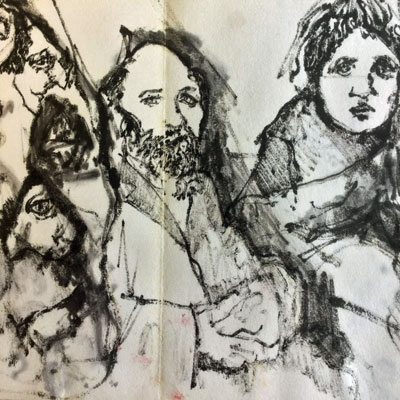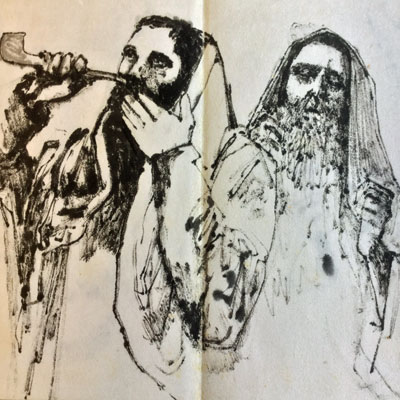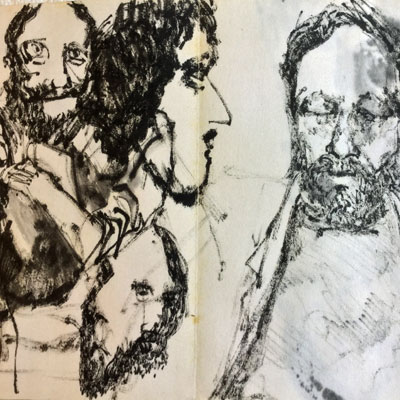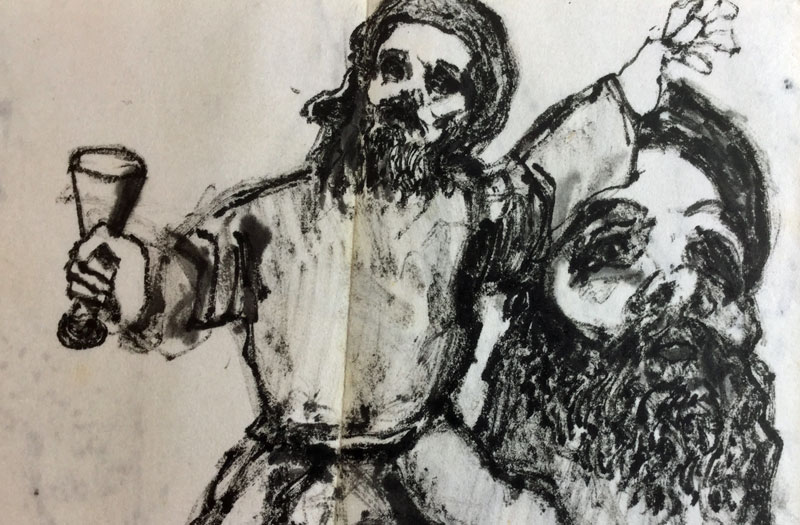As our Independence Day fades into the unsavory miasma of what proves to be an entertaining but disappointing Presidential election season, I find myself unable to let go of one of my all-time heroes, Tom Paine. Googling about in a fit of nostalgia for the “good ole days,” my faith in serendipity was confirmed. Daniele Bolelli, author, martial artist, professor, Italian with the high energy of Roberto Benigni (Life is Beautiful), my equal in his love for Paine, also a lover of Lao Tzu and William Blake (too good to be true !), and Nietzsche, Thoreau, and Bertrand Russell among others. What’s not to like about this man was my immediate thought. I quickly purchased his book 50 Things You’re Not Supposed to Know: Religion and read it from cover to cover. Highly recommended for secular eclectics and other odd people. Pair it with Dark Night of the Soul, a poem left untitled by St. John of the Cross (see below and don’t let the “Saint” thing dissuade you—I don’t believe in such things either; I’ve always suspected the Catholic Church makes up Saints when the flock begins to drift).

Charcoal Drawing, Kent Chapman
Excerpt from 50 Things You’re Not Supposed to Know: Religion by Daniele Bolelli, Chapter 2
The story of his life is richer and weirder than any fiction. Among his close friends were visionary poets such as William Blake as well as political icons like Benjamin Franklin. Napoleon slept with his books by his pillow, and told him statues of gold should be erected to him in every city in the universe (but the admiration was not reciprocated). Thomas Edison believed him to be one of the most brilliant minds in human history. Some of his writings rank among the greatest bestsellers of the 18th century. He participated in the two revolutions (the American and the French) that changed the political face of the modern world.
During the American Revolution, George Washington used his writings to inspire his troops to remember what they were fighting for, and even suggested that no other individual had done more for the cause of American independence. John Adams stated that without his pen, Washington’s military victories would have been in vain. In France, the revolutionaries invited him to join the National Convention in charge of drafting a new constitution. His unconditional love for freedom, however, made him allergic to “revolutionary” totalitarianism just as much as he was opposed to monarchic totalitarianism. So, Robespierre and his proto-fascist cronies had him arrested and sentenced to death. But the blade of the guillotine missed the date with his neck thanks to a mistake by the jailer in delivering condemned prisoners. Before the mistake was fixed, a future American president, James Monroe, intervened on his behalf and had him rescued. And another president, Thomas Jefferson, personally offered him political asylum.
The man we are speaking of is Thomas Paine.
Even though his name is relatively well known, it is not nearly as celebrated as one may imagine given such a wild, intense existence, and such a deep impact on history. Paine was after all the man who came up with the terms “United States of America,” and is credited by many to be the ideological father of modern democracy. So why is his face not on the dollar bills? Why is he not hanging out with Jefferson & co. on Mt. Rushmore? Why is he not given his due among the greatest American heroes?
Paine’s problem is that he didn’t die in 1792. Had he done that, his place among the pantheon of beloved founding fathers would have been assured. But instead he lived, and wrote another book entitled The Age of Reason. The result? By the time he actually died in 1809, only six people attended his funeral. The most repeated of his obituaries by the newspapers read, “he had lived long, did some good and much harm.” His supporters found themselves under relentless attacks. Thomas Jefferson’s political opponents had a field day using over and over his friendship with Paine against him. Abraham Lincoln’s friends burned a booklet he had written, in which he defended Paine’s ideas, for fear that this would irreparably ruin his reputation. Over a hundred years after Paine’s death, Theodore Roosevelt still referred to him as a “filthy little atheist.”
What exactly was it about The Age of Reason that transformed Paine into a ghost among the founding fathers? Why did he turn overnight from popular hero into a hated villain? It’s because the man took on organized religion with a furor, in an age when doing so was neither fashionable nor conducive to good health.
As he wrote, “I do not believe in the creed professed by the Jewish church, by the Roman church, by the Greek church, by the Turkish church, by the Protestant church, nor by any church that I know of. My own mind is my own church. All national institutions of churches … appear to me no other than human inventions, set up to terrify and enslave mankind, and monopolize power and profit.”
When he had composed passionate defenses of freedom against political tyranny, the masses had loved him. But now that he had composed a passionate defense of freedom against religious tyranny, they hated him. Paine hadn’t changed. It’s simply that his audience was much readier to attack political rather than religious institutions. But for Paine tyranny was tyranny regardless which adjective was attached to it. To him, sworn enemies like the king of England and Robespierre, the pope and Martin Luther were but different faces of the same evil. Whether they called themselves monarchists or revolutionaries, Catholics or Protestants, whether they indulged in inquisitions or guillotines, didn’t matter much since they were all equally addicted to totalitarianism. The Age of Reason was Paine’s declaration of war against the religious dogmatism that had squashed individual liberties over the centuries.
The fame of being a godless atheist followed Paine like a shadow forever afterwards. But the punch line in all of this is that Paine was anything but an atheist. It was precisely because he believed in God that he despised organized religions since—in his view—these turned the divine mystery into bad mythology, and projected onto God their own psychotic hopes and fears. In Paine’s brand of freedom-loving spirituality, God was something greater than any religion. And this was the belief that cost Paine his place of honor among the founding fathers.

Charcoal Drawing, Kent Chapman
By St. John of the Cross
Translated by A.Z. Foreman
Translators Note:
A number of Catholic readers have emailed me with devotional questions regarding this poem. Let the reader be informed that I am not equipped to answer such queries as I am not Catholic. In point of fact, I am an atheist.

Charcoal Drawing, Kent Chapman
Once in the dark of night,
Inflamed with love and yearning, I arose
(O coming of delight!)
And went, as no one knows,
When all my house lay long in deep repose
All in the dark went right,
Down secret steps, disguised in other clothes,
(O coming of delight!)
In dark when no one knows,
When all my house lay long in deep repose.
And in the luck of night
In secret places where no other spied
I went without my sight
Without a light to guide
Except the heart that lit me from inside.
It guided me and shone
Surer than noonday sunlight over me,
And led me to the one
Whom only I could see
Deep in a place where only we could be.
O guiding dark of night!
O dark of night more darling than the dawn!
O night that can unite
A lover and loved one,
Lover and loved one moved in unison.
And on my flowering breast
Which I had kept for him and him alone
He slept as I caressed
And loved him for my own,
Breathing an air from redolent cedars blown.
And from the castle wall
The wind came down to winnow through his hair
Bidding his fingers fall,
Searing my throat with air
And all my senses were suspended there.
I stayed there to forget.
There on my lover, face to face, I lay.
All ended, and I let
My cares all fall away
Forgotten in the lilies on that day.
The Original:
La Noche Oscura Del Alma
San Juan De La Cruz
Cançiones del alma que se goça d’auer llegado al alto estado de la perfecçion, que es la union con Dios, por el camino de la negaçion espiritual
En una noche obscura,
con ansias en amores imflamada,
¡oh dichosa uentura!
sali sin ser notada,
estando ya mi casa sosegada.
A escuras y segura,
por la secreta escala disfraçada,
¡oh dichosa uentura!
a escuras y ençelada,
estando ya mi casa sosegada.
En la noche dichosa,
en secreto, que nadie me ueya,
ni yo miraua cosa,
sin otra luz ni guia
sino la que en el coraçon ardia.
Aquesta me guiaua
mas cierto que la luz del mediodia,
adonde me esperaua
quien yo bien me sabia,
en parte donde nadie parecia.
¡Oh noche que me guiaste!
¡oh noche amable mas que el aluorada!,
¡oh noche que juntaste
amado con amada,
amada en el amado transformada!
Y en mi pecho florido,
que entero para el solo se guardaua,
alli quedo dormido,
y yo le regalaua,
y el ventalle de cedros ayre daua.
El ayre de la almena,
cuando ya sus cabellos esparzia,
con su mano serena
en mi cuello heria,
y todos mis sentidos suspendia.
Quedeme y oluideme,
el rostro recline sobre el amado,
ceso todo, y dexeme,
dexando mi cuidado
entre las açucenas olvidado.

